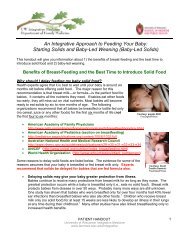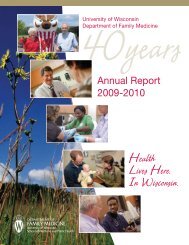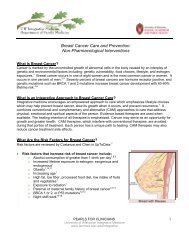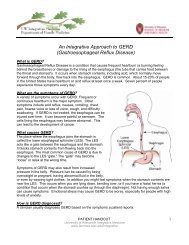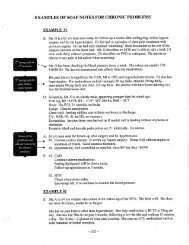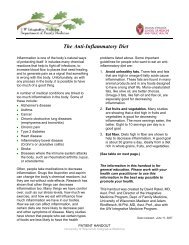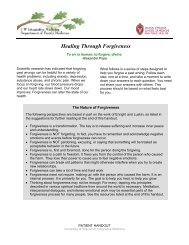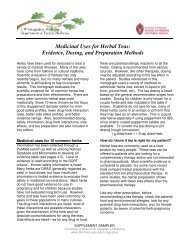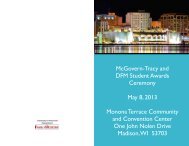Mental Notes Magazine - UW Family Medicine - University of ...
Mental Notes Magazine - UW Family Medicine - University of ...
Mental Notes Magazine - UW Family Medicine - University of ...
You also want an ePaper? Increase the reach of your titles
YUMPU automatically turns print PDFs into web optimized ePapers that Google loves.
patient becomes a subject similar to an object.<br />
<strong>Medicine</strong> has defined diseases as universal pathological<br />
entities, with a set <strong>of</strong> fixed characteristics that transcend<br />
history and society, because they are independent<br />
<strong>of</strong> where or when they occur. The epistemological<br />
orientation towards biochemistry, biophysics and<br />
statistics makes doctors perceive different diseases as<br />
minimal variations <strong>of</strong> the same pattern <strong>of</strong> traits, which,<br />
by themselves, are ‘objective’, that is, real and noncontingent.<br />
Departing from this definition<br />
and assumptions, doctors are not inclined<br />
to accept subjective conceptions <strong>of</strong><br />
diseases as reported by patients or their<br />
relatives.<br />
But, the disease lived as an illness<br />
impacts on the patient’s beliefs, that is, on<br />
his representations, his will, his cognitions<br />
and feelings, his ideology, etc. The illness<br />
is a personal matter <strong>of</strong> uttermost<br />
importance. The patient’s viewpoint<br />
interferes in what the disease ‘is’ because<br />
the disease, when lived by a person,<br />
becomes ‘his’ or ‘hers.’ The patient’s<br />
perspective in relation to the origin,<br />
cause, development and/or solution <strong>of</strong><br />
his/her symptoms may have no scientific<br />
basis. Nevertheless, the individual has<br />
rights, the right to be taken into account.<br />
Physical pain may be considered the<br />
A disease can change a person<br />
most tragic fact. A simple diet<br />
can be considered a total<br />
punishment. A medication<br />
can be seen as a ‘demoniac’<br />
danger, leading the patient to<br />
interfere with its prescription.<br />
Crossed-eyes can be total<br />
destruction <strong>of</strong> the selfesteem<br />
<strong>of</strong> a woman. A<br />
small biologically irrelevant<br />
mutilation, such as the loss <strong>of</strong><br />
the fingertip, may represent<br />
the difference between<br />
happiness and depression.<br />
So, the subjectivity <strong>of</strong> the<br />
patient is always awake in the<br />
process <strong>of</strong> illness, and cannot<br />
be erased from his/her<br />
encounter with doctors.<br />
The man or woman who<br />
suffers is struck by the disease<br />
in his/her heart, and this is<br />
not only metaphoric. A disease can change a person, and<br />
severe diseases change more extensively. This is why the<br />
ill person needs much more than simply to be attended<br />
using the most modern, precise and sophisticated<br />
techniques, the patient needs to be understood.<br />
The relationship between a person and a disease has to<br />
be mediated by another individual. The physician must<br />
interact not only with the ‘fact’ <strong>of</strong> the disease, but with<br />
the person, the suffering and demanding person. At this<br />
Doctors must be aware <strong>of</strong> the meanings lived by patients<br />
while they are suffering their diseases<br />
Summer 2012 / <strong>Mental</strong> <strong>Notes</strong> / 9



